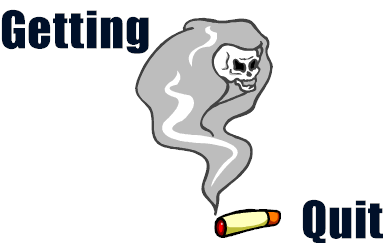
SMOKING . . .

Okay, everyone's told you to quit. You
realize it's bad for your health, but you just can't seem to quit!
It is indeed the hardest thing many people
(including myself) have done. However, it really can be done, and it really is
worth it. Just as with so many things to do with health habits, there is no
"magic bullet" which will cure the problem . . . but there are many
things that can help if you're truly wanting to quit.
That's just the problem . . . I almost
want to quit . . . but not quite enough to do it.
As we'll see, that's really not an unusual
sentiment. And there's a reason for it. I have not really known anyone who was
absolutely sure they wanted to quit, or were absolutely sure they were going to
be able to do it. However, I know many, many people who have quit despite their
doubts.
Smokers get tired of hearing it, and
physicians get tired of saying it, but make no mistake, it is so very important.
In fact, the American Heart Association declares that it is "THE SINGLE
MOST ALTERABLE RISK FACTOR" contributing to early death in the United
States, accounting for 400,000 deaths annually. It has been estimated
that about 1/2 of smokers will be killed by their habits, and that a person in
their 20's will live one-quarter less than a non-smoker of the same age. Let's
look at quitting from the following angles, and see if there aren't some
strategies that will help YOU quit.
The leadoff: What does smoking do to your
health?
Why should I quit?
Why is it so hard?
Besides
the addiction to nicotine, what else keeps me smoking?
But I've smoked so long . . . why bother quitting now?
Some numbers about smoking
What are the methods of quitting?
Which is the best way for me to stop?
(Take our test)
How about if I just cut back or use one of the low-tar & nicotine brands?
Are there any programs that can help?
But aren't I going to gain weight if I stop?
What about nicotine patches?
What about nicotine gum?
What about nicotine spray?
What
about the nicotine inhalers?
What about these anti-depressant drugs I hear about?
How about hypnosis or acupuncture?
I'm afraid I might relapse after I stop. What can I do?
What about "second hand smoke"?
How do I help my teenager quit?
The Big Points
The leadoff: What does
smoking do to your
health?
Surely you've heard by now that smoking
damages your health (if you're tired of hearing it, skip this section). If
you already have one of the diseases listed below, you may be virtually certain
that the cigarettes you have smoked contributed, perhaps greatly. Furthermore,
you can also count on stabilizing or reversing the problems if you quit.
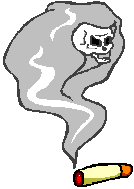 organizations in getting out their message
about smoking. Smoking kills more people through its increase in
heart attacks than it does with cancer or emphysema! Let's look at some of
the cardiovascular risks:
organizations in getting out their message
about smoking. Smoking kills more people through its increase in
heart attacks than it does with cancer or emphysema! Let's look at some of
the cardiovascular risks: The fact that smoking causes problems for
the heart arteries is not surprising when you consider that smoking has been
demonstrated to:
Well, obviously to avoid the problems
above. But beyond this, consider
 You'll see it even more clearly when
you stop . . . you're addicted to a drug. It is a potent addiction. It is
amazing how this addiction works its way into you, convincing you that you need
another cigarette. One of the amazing things I discovered after stopping
smoking, and I did it for a long time, was that I felt I had less stress. The
addiction spoke to me, convincing me I needed some help dealing with a stressful
situation. In fact, after I quit smoking, there suddenly didn't seem to be as
many problems that required so much thinking!
You'll see it even more clearly when
you stop . . . you're addicted to a drug. It is a potent addiction. It is
amazing how this addiction works its way into you, convincing you that you need
another cigarette. One of the amazing things I discovered after stopping
smoking, and I did it for a long time, was that I felt I had less stress. The
addiction spoke to me, convincing me I needed some help dealing with a stressful
situation. In fact, after I quit smoking, there suddenly didn't seem to be as
many problems that required so much thinking!
Nicotine is the addictive agent in tobacco.
A smoker delivers an average of 200-300 discrete doses of nicotine to their
brain each day (a heroin addict generally only delivers 2 doses and a cocaine
addict 5-15 doses of their drug). Nicotine does have a euphoric effect which
makes people feel better in the short run. As in all addictive drugs, this
effect decreases over time, and increasing doses are needed to obtain lesser
feelings of well-being. As in all addictive drugs, there are symptoms of
withdrawal that are well known to smokers (and perhaps underestimated by
non-smokers). These symptoms include
Stories from those who have quit other
addicting drugs like alcohol, cocaine, and others, they will tell you that
smoking ranks right up there as one of the most difficult drugs to quit.
Smokers who are given differing amounts of
nicotine in "study cigarettes" show a remarkable ability to adjust
their intake to maintain a stable level of nicotine intake over a day. In
addition, there is an addictive component to the intermittent increases in
nicotine levels which accompany smoking a cigarette. This is important when
considering some of the means used to quit smoking.
Besides the addiction to nicotine, what else keeps me smoking?
The addiction to nicotine certainly makes it
hard to quit, but so do some of the behavioral aspects of smoking. Smoking also
provides other side benefits which are real. These are some of the other reasons
it's hard to stop. See which of the following areas seem to be important to you,
and then note some of the solutions to minimize their importance as you plan to
quit.
Stimulation. It helps you wake up, get
organized, and get going.

Handling. You enjoy some of the rituals of
smoking.
Doodle
Handle a coin or rock.
Clean or polish your fingernails
Wear a rubber band around your wrist and snap it.
Pleasure. If you enjoy the
"luxury" of the feeling that smoking gives you, then
Keep a list of the
pleasures of non-smoking.
Keep a list of the displeasures that smoking already or will cause.
Begin an enjoyable exercise program.
Treat yourself to something special.
Relaxation. Smoking can be the classic
"crutch" in times of discomfort. You may find it much easier to stop
when things are going well, but particularly difficult when things are going
poorly.
Try to find other
relaxing alternatives, such as listening to music, a walk or a talk.
Take up a hobby or sport.
Take deep breaths. Learn other relaxation techniques..
Craving. Join the club! That's the
combination of the physical, mental, and psychological components of this
complex and powerful addiction.
Change your
routine. Take a different route to work. Drink tea if you're a coffee drinker,
etc.
You may benefit particularly from nicotine replacement therapies noted below.
Habit. You smoke automatically. Chances are
you don't enjoy many of them.
Throw away your
cigarettes, ashtrays, etc.
 If your spouse or friends smoke, designate a part of your home as
"smoke-free".
If your spouse or friends smoke, designate a part of your home as
"smoke-free".
Go to places where smoking is prohibited, such as theaters, libraries, etc.
Always sit in the non-smoking parts of restaurants.
Have your car cleaned.
But I've smoked so long . . . why bother
quitting now?
Because the benefits begin
IMMEDIATELY.

You see, it really does not matter how long
you've smoked. These are reliable changes which you will enjoy.
25% of Americans smoke, and 70% of them
would like to quit. 30% of them try to quit in any given year. About 2.5%
succeed in a given year (this is all comers, whether they try and get help at
all or not). Eventually, 50% of all smokers quit.
The percentage of smokers fell quite a bit
with initial public education attempts in the 70's and 80's. In 1965, 52% of men
and 34% of women were smokers. By 1991, these percentages were 28% for men and
24% for women. The numbers are not falling as quickly now.
Smoking costs are estimated at $50 billion
dollars per year. To cover these costs, the taxes on a pack of cigarettes should
be about $4.
3000 teenagers start smoking every day.
The medical costs of smoking are $50 billion
dollars each year. If you add the lost productivity, the costs rise to $97
billion dollars per year.
 What are the methods of quitting?
What are the methods of quitting?
There are many . . .
"Cold Turkey".
That world famous sudden cessation. The advantage is getting it over with. It is
still quite effective for many, many people.
"Gradual Tapering".
Seems to make the most sense in that it addresses cutting down the level of
craving before totally stopping. My own experience with people trying to quit is
that it is one of the least effective ways. The commitment is to eventually
stopping, and most people will go ahead and have an extra cigarette.
"Cutting back"
may sound like a very good idea, but actually probably doesn't do much to lower
your health risks substantially. Most people go back to their previous levels
rapidly. If it's a first step towards quitting that has a limited time frame
(say, one month) with a commitment to stop after this, then it may be a useful
technique for a very few people.
Nicotine replacement therapy
has a proven record of aiding in quitting. There are numerous forms available
these days. There are two main types: patches (which provide a continuous supply
of nicotine, aiding in losing the addiction to the "spike" of nicotine
which occurs with smoking) and others which replace nicotine in
"doses" delivered by gum, nasal spray, or other products.
Antidepressants
such as Zyban may be useful as an aid for quite a few people.
Stop smoking clinics and programs,
both commercial and non-profit are available.
Self-help tapes and books
(and this website) are available as guides.
Which is the best way for me to stop?
You can use the test
to give
yourself some idea of the major factors which stimulate your smoking behavior.
How about if I just cut back or use one
of the low-tar & nicotine brands?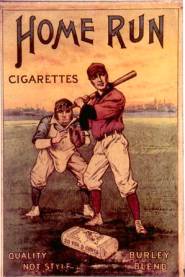
There is only a minimal decrease in risk
from these brands. Additionally, since the other toxins in the cigarettes are
unchanged, and since more cigarettes are smoked to obtain the same amount of the
addictive nicotine, there have been suggestions that the incidence of diseases
associated with smoking actually increase.
There is little difference in mortality
between those who smoke filtered or non-filtered brands.
Are there any programs that can help?
The American Cancer Society generally
sponsors several different types of programs at a modest cost ($40-65), as does
the American Lung Association. SmokeEnders and Schick Centers are commercial
programs generally charging $250-350. The Seventh Day Adventist Church offers
retreats in many areas. Your own physician or local hospital may have programs
available.
Other sources of information include:
|
American Cancer Society |
Nicotine Anonymous |
SmokEnders, Inc |
|
American Lung Association |
Nursing Center for Tobacco
Intervention |
|
|
Amer Public Health Assoc |
SmokeFree Educational Services |
|
But aren't I going to gain weight if I
stop?
Not everyone gains weight when they stop
smoking. The average amount of weight gained is generally around 8-12 pounds in
most clinical studies. Even though being overweight increases health risks,
stopping smoking is so important that some weight gain is a small issue in
comparison.
Nicotine patches are generally very
effective when used by a motivated smoker. Most people note a very substantial
decrease in their withdrawal symptoms. These symptoms will not totally
disappear, but instead of being overwhelming and almost all-encompassing, the
symptoms often become manageable.
There are several manufacturers and several
strategies for the use of the nicotine patches. Many come in 7, 14, and 21 mg
strengths. Most people who smoke one pack per day find that the 21 mg patch is
the most effective in diminishing their withdrawal symptoms. Most physicians
recommend using the 21 mg patch for 6 weeks, the 14 mg patch for 2 weeks, and
the 7 mg patch for 2 weeks, and then discontinuing. I generally add to this to
keep one or two of the 7 mg patches around if the person's not quite ready to
quit so they can slap one back on and buy some more patches.
Patches may be worn during the day only, or
throughout the 24 hour period. Use of the patches at night is often associated
with sleep disturbances, restlessness, vivid dreams or nightmares. Taking them
off at night may be associated with withdrawal symptoms when one wakes up in the
morning.
The patch itself may cause some skin
irritation. This can be minimized by using the patch on an area of the skin that
is thick (such as the shoulder, back or thigh). Apply it to a hairless are of
skin, hold it for 10 seconds. You should wash your hands after doing this to
avoid getting chemicals in your eyes. To avoid skin irritation, move the patch
around. If irritation does develop, some of over-the-counter steroid cream is
usually effective in quieting it down.
One should avoid smoking while the patch is
on and within 15 minutes of taking the patch off. This is felt to be dangerous
due to the additive nicotine levels. It also simply defeats the purpose of the
patch.
There are three manufacturers of patches:
Use of patches generally double the success
rates of other programs. They are not a panacea. There is not one milligram of
will-power contained in the patch or any other nicotine replacement therapy.
Lot's of people fail, and others relapse. It can be very helpful for some people
however. I think that patches have an additional advantage of having a constant
level of nicotine in the blood, as opposed to the peaks and valleys associated
with smoking and with other nicotine replacement strategies.
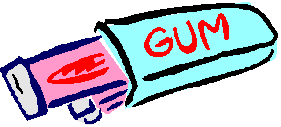 Nicotine bound to a resin which is chewable
can be helpful. It is somewhat difficult to use.
Nicotine bound to a resin which is chewable
can be helpful. It is somewhat difficult to use.
The gum should not really be chewed
continuously as one would chew a stick of gum. The intent is to have the
nicotine absorbed in the lining of the mouth. If chewed too quickly, it can
often lead to an upset stomach. After a few chews, it can then be
"parked" between the cheek and gum.
Levels of nicotine increase and decrease
with the amount of chewing that is going on. This duplicates the changing levels
found when a person is smoking. The peak nicotine level is only about 40-50% of
that obtained with smoking, so withdrawal symptoms are decreased but not totally
eliminated.
When used in the proper settings, nicotine
gum can double quit rates. Some people get "hooked" on the gum, but
this is probably preferable to smoking with all of the other chemicals that are
ingested. Most people will use the gum for 3-6 months before totally stopping
nicotine intake.
A nicotine nasal spray is available. It
provides probably the highest serum levels of nicotine of all of the nicotine
replacement techniques. 95% of people note nasal irritation within 48 hours of
starting its use and this will generally continue throughout the period of time
it is used.
This form of replacement can be fairly
effective in minimizing withdrawal. This is due to the rapid rise of nicotine
which occurs. This can be addictive, too.
What about the nicotine inhalers?
Nicotine inhalers are a plastic mouthpiece
with a nicotine-containing cartridge which is punctured when placed in the
mouthpiece. The nicotine is inhaled not through the lungs as with a cigarette,
but through the tissue lining the mouth. Nicotine levels are therefore somewhere
around that delivered by nicotine gum. This is available by prescription.
Smoking cigarettes is to be stopped while using these devices.
Dosing is for a minimum of 3 weeks to a
maximum of 12 weeks. It has only been studied for 6 months as the maximum
duration. It is suggested that at least 6 cartridges be used per day, with a
maximum of 16. Gradual tapering over the next 6-12 weeks is then suggested. No
specific tapering schedule has been found to be superior to others in trials.
People who use these generally experience
mild irritation of the mouth or throat or a cough when first using these
products.
This product does replace the actions of
smoking as well as the nicotine and can be quite effective for some people.
What about these anti-depressant drugs I
hear about?
Buproprion is an agent used as an
antidepressant for many years. It was noted that people on this agent found it
easier to discontinue smoking. A long-acting or sustained release form of the
agent was developed an is called Zyban which is promoted to aid in the
discontinuation of smoking.
 It is appealing to some since smoking is
continued at the beginning of therapy.
It is appealing to some since smoking is
continued at the beginning of therapy.
It can be even more effective when used in
combination with nicotine replacement products. The blood pressure should be
monitored when these two are used together since blood pressure may increase.
Zyban is given as 150 mg daily for 3 days,
and then 150 mg twice daily (at least 8 hours apart) for 6 weeks-3months. The
person continues to smoke as Zyban therapy is started. A quit date should be set
during the second week of therapy. The drug should be stopped if the person is
still smoking by the seventh week of therapy.
Zyban is definitely to be avoided at higher
doses, and the dose needs to be adjusted for people with some kidney and liver
diseases. It should not be used by people with seizure disorders or those taking
medications known as "MAO Inhibitors". The use of alcohol is to be
avoided. Potential side effects include restlessness, dry mouth, insomnia and
other emotional disturbances, as well as gastrointestinal side effects such as
nausea, constipation and diarrhea. It is available by prescription.
How about hypnosis or acupuncture?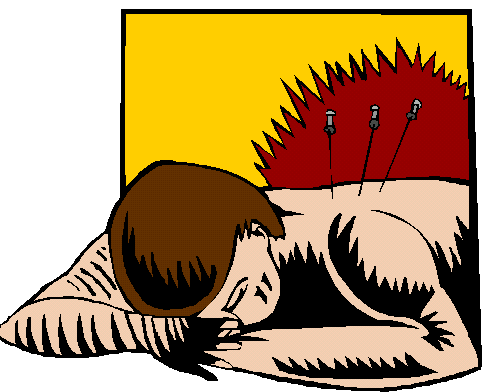
These are popular remedies. Hypnosis in
particular seems to be easy because one would hope that the post-hypnotic
suggestion would ease the urge to smoke and virtually prevent one from lighting
up. It does not quite work that well. Results with both acupuncture and hypnosis
generally are about as effective as the nicotine replacement strategies. Success
will tend to be somewhat better with some therapists than others.
If these are techniques that you may feel
are helpful, you should give them a try. Just like with any of the other
techniques, if it doesn't work, realize it isn't for everyone . . . and try
another technique that may be right for you.
I'm afraid I might relapse after I stop.
What can I do?
This is a well placed fear. Relapse is
common, and often related to some fairly easy things to control.
Learn to recognize dangerous situations: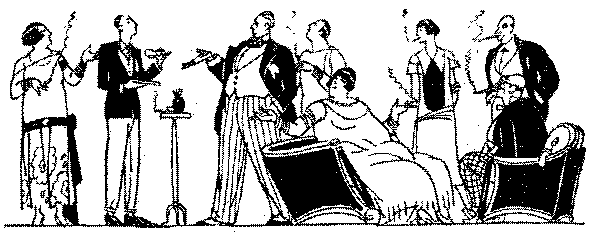
![]() Being
around smokers
Being
around smokers
![]() You
will often feel more need to smoke if you're under time pressures
You
will often feel more need to smoke if you're under time pressures
![]() Getting
into an argument.
Getting
into an argument.
![]() Experiencing
urges or negative moods.
Experiencing
urges or negative moods.
![]() Using
alcohol
Using
alcohol
Remember, don't smoke even one
cigarette . . . don't take even a single puff! You only have to say no to one
cigarette to be a success.
Take some positive steps to decrease your stress.
There will be a few tough spots for every
one. They need not be causes for failure. Here are some of the most common
problems and their solutions.
![]() Irritable?
Just about everyone will be. Take a walk, enjoy a hot bath, practice relaxation
techniques.
Irritable?
Just about everyone will be. Take a walk, enjoy a hot bath, practice relaxation
techniques.
![]() Can't
sleep? Avoid caffeine after 6 PM. Don't use alcohol to help.
Can't
sleep? Avoid caffeine after 6 PM. Don't use alcohol to help.
![]() Fatigue?
Take a nap. Don't push yourself right now.
Fatigue?
Take a nap. Don't push yourself right now.
![]() Constipation
or gas? Drink plenty of fluid, eat fruits and vegetables and whole grains.
Constipation
or gas? Drink plenty of fluid, eat fruits and vegetables and whole grains.
![]() Craving?
Wait out the urge . . . it will only be there a few minutes. Distract yourself.
Craving?
Wait out the urge . . . it will only be there a few minutes. Distract yourself.
Remember, talk to your physician, your buddy
or your counselor if you're having problems. A brief visit might just help you
over the hump.
What about "second hand smoke"?
Talk about a touchy subject! As an
ex-smoker, I do remember what it feels like to hear about possible effects on
non-smokers from people who smoke. Smoking has as part of its appeal the sense
of individualism and personal choice. Smokers in general do not wish to harm
others, but do wish to be "left in peace" to do their smoking. It has
been particularly difficult for some long-term smokers to adjust to newer, and
more restrictive policies regarding public smoking. Spouses who wish to be
supportive may find it difficult to tolerate their partner's habit that could be
shortening their life as well.
Nevertheless, the data is pretty convincing
that there is an effect from "passive smoking". It really makes sense
that it would if you're honest about the statistics associated with "active
smoking" -- these are really nasty chemicals, nasty enough that they don't
need to be inhaled directly from the cigarette to cause problems.
Studies have shown a pretty consistent 20%
increase in the risk of coronary artery disease for spouses of smokers. Some
studies have shown a doubling of the risk.
The risks are actually about the same for
those exposed to smoke in the workplace.
By the way, this should also be an answer to
all of those who say "I mostly just let them burn up in the ashtray".
If they are in that room, that burning cigarette is still causing disease!
How do I help my teenager quit?
Indeed, this is a good place to expend some
effort. The length of addiction is shorter, and this can make things a little
easier. Don't kid yourself however. Addiction can be strong even if it hasn't
been going on for long. Additionally, the average teen is under different
stresses and has developed fewer coping skills to help themselves.
The National Cancer Institute has developed
a strategy called the "Five A's"
o
Parents, friends or siblings who
smoke.
o
Poor self image
o
Poor academic performance
o
Risk-taking behavior
o
Exposure to media influences
o
Bad breath
o
Yellow teeth
o
Smelly clothes
o
Keep a 1 week diary of tobacco
use
o
Make a list of reasons to quit
o
Figure rewards for success.
o
Help develop skills to refuse
peer pressure.
Two resources directed at teens for stopping
smoking are:
Stop Teenage
Addiction to Tobacco (STAT)
511 East Columbus Avenue
Springfield, MA 01105
413-732-7828
National
Federation TARGET Program
P.O. Box 20626
Kansas City, MO 64915-0626
816-464-5400
It is difficult, but extremely possible, to
quit smoking
The benefits of quitting begin almost
immediately and continue to increase over time.
You owe it to your health to really consider
this, work on a plan now, and implement it very soon.
It does not matter how long you've smoked. The benefits of quitting begin quickly . . . and last the rest of your life.
Take our test to see which method you should consider when quiting smoking
©COPY;1997 HeartPoint Updated August 1999

![]()
| Commentary |
Food You Will Love | HeartPoint
Gallery | In The News | Health Tips | What's New
|
| Information Center | Home
|
This site presents material for your information, education and entertainment. We can assume no liability for inaccuracies, errors, or omissions. Above all, material on this site should not take the place of the care you receive from a personal physician. It is simply designed to help in the understanding of the heart and heart disease, and not as a diagnostic or therapeutic aid. You should seek prompt medical care for any specific health issues. Please feel free to browse the site and download material for personal and non-commercial use. You may not however distribute, modify, transmit or reuse any of these materials for public or commercial use. You should assume that all contents of the site are copyrighted. ©COPY;1997 HeartPoint